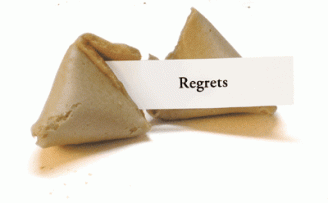The Situation of Regret
Posted by The Situationist Staff on January 28, 2008
 David Dudley has a worthwhile article on regret in the current edition of the AARP Magazine. We have excerpted some portions of it below.
David Dudley has a worthwhile article on regret in the current edition of the AARP Magazine. We have excerpted some portions of it below.
* * *
Regret, according to those who study it, is all but universal, spanning age and culture in its agonizing variations. For every choice we make—good and bad—a numberless multitude of options are left untried, each one an opportunity to second-guess, brood, and ask yourself the perilous question: What if? Social psychologists call this “counterfactual thinking,” and it’s among the most complex feats of cognition the human mind is capable of. “If you talk about the emotion of regret, you want to differentiate that from simpler emotions like pain and fear, which seem to be experienced pretty much the same way by animals,” says Neal Roese, Ph.D., a psychology professor at the University of Illinois. “Regret is a very complicated emotion that involves all these things coming together—it’s raw feeling plus all the complicated imaginings of future possibility.”Thinking about the what-ifs requires a complex mix of real and imagined events, and it’s essential to our decision-making process. Faced with a choice, we automatically spin out alternative worlds in which we marry the other woman, don’t order the clams, buy the bigger car, or stay in school. This endless procession of possibilities is essential for helping us make sense of the world: the sharp, corrective sting of regret teaches us where we went wrong and how to do better the next time. But when the system breaks down—when reflecting on a flawed past becomes a crippling fixation—the results can be devastating, physically and mentally. Carsten Wrosch, Ph.D., a psychology professor at Concordia University in Montreal, has linked high regret with a variety of maladies, including sleep problems, migraines, chest pains, and skin conditions.
* * *
. . . “There’s anecdotal evidence that this generation, and this society, really has a harder time with regret,” says Hamilton Beazley, Ph.D., a scholar-in-residence at St. Edwards University in Austin, Texas, and the author of No Regrets: A Ten-Step Program for Living in the Present and Leaving the Past Behind (Wiley, 2004). . . . “In a sense,” he says, “it can be said we’re in an Age of Regret.”If regret is a growth industry, that may be partly a reflection of the vast number of graying boomers entering their regretting years. “One of the primary psychological tasks of people between the ages of 40 and 65 is to go through a period of re-evaluation and introspection regarding their lives,” Beazley says. “And because the baby boomers have always had such an impact on society, we drive the Zeitgeist of our time.” But there’s more to it than that. In Beazley’s view, the prevailing sunniness of growing up in postwar America—the “can-do sense of prosperity and faith in technology” that the boomers were inculcated with as they came of age amid revolutions in science and culture and personal expression—has primed a nation to have its youthful dreams dashed by the narrowing of options that time brings. “This generation has greater idealized expectations—the ones that can’t be met—than previous generations,” Beazley says. “The baby boomers really believe that negative events, even things like getting older, shouldn’t happen.” . . .
”Regret is also a topic of growing interest to cognitive researchers, says Roese, whose book If Only: How to Turn Regret Into Opportunity (Broadway, 2005) explores the role of what-if thinking in behavior, history, and popular culture. Studies of people with a neurological inability to experience regret show just how essential this mental skill is: without regret, basic decision-making and social skills are severely impaired. “There’s a value in negative emotions,” Roese says. “Regret in particular is useful for signaling to people that it’s time to change their strategy. If you’re ruminating daily on how things could have been better, that’s not good, but a sharp, rapid emotional response followed by a behavioral change, followed by the disappearance of the emotion—that’s perfectly good for us.”
* * *
In other words, regret—and our acute desire to avoid it—is a major part of healthy living. “Regret is not something that’s just a curse or a nuisance to our daily living,” says Roese. “It’s an indicator of our brains trying their best to guide us through complicated social environments.”
complicated social environments.”
Researchers have noticed age-related distinctions in how and why we experience regret. The young are more likely to regret things they did rather than things they didn’t do. After all, at that stage in life there’s still time to see Australia, climb K2, or write a novel. But as we age, this tendency reverses, and it’s what you didn’t do that stings. When you look back and see all the mountains left unclimbed, the sense of loss can be devastating.
How we respond to regret depends on several factors, including our ability to correct whatever we did (or didn’t do) wrong. It’s the element of control that makes the regret powerful. “If you can fix it, the negative emotions, especially regret, tend to be stronger and longer lasting,” Roese says. “If you can’t fix it, something in our brain kicks in and shuts it down. ” In studies on consumer satisfaction, shoppers seem to prefer not having the option to return an item. “The mere fact of being able to return it makes you less satisfied—you’re still wringing your hands about it a month later,” Roese says. “If you can’t take it back, it’s a done deal, and you’re actually more satisfied.”
* * *
Barry Schwartz, Ph.D., a psychology professor at Swarthmore College, in Pennsylvania, has termed this the paradox of choice—the more choices we have, whether in televisions or careers, the greater the likelihood we’ll be dissatisfied with the results. Or, like Jane, we’ll defer making any decision at all: in one study, subjects presented with dozens of kinds of jams proved less likely to buy any jam than did participants who could choose from only a few. Applying the model to life decisions, a mild case of buyer’s remorse becomes a major source of life regret. “In a world where there are an almost infinite number of choices, the number of things you could have done will be much greater,” says Schwartz, who argues that the more-than-tripling rate of clinical depression in the past two generations is related to the concurrent explosion in choice, consumer and otherwise.
The problem, Schwartz warns, could be exacerbated as people face a new supermarket of options for health care and retirement planning—and a society that places unprecedented responsibility on the individual to choose his or her own doctors and savings plans. “One of the things all these choices do is make it very hard not to blame yourself for the things that go wrong,” he says. “It’s going to be hard to convince tomorrow’s 70-year-olds that everything in their lives isn’t their fault.”
* * *
Plus, there’s evidence that elderly people subconsciously immunize themselves to the kinds of corrosive regret that prey on younger or middle-aged people. It’s called the positivity effect, according to Laura Carstensen, professor of psychology and director of the Stanford Center on Longevity at Stanford University. Older people generally score higher in self-reported tests of happiness than younger people do—in part, she believes, because they are more likely to remember events and memories that improve their emotional well-being and selectively ignore ones that might make them unhappy. She believes this selectivity is a function of the relative importance of being happy in the present. “As people age, they take into account the amount of time they have left,” Carstensen says. But instead of aggravating regret, this awareness in late life can redirect emotional attention away from potential regret-producers. “When time is perceived as being constrained, people tend to pursue goals related to feeling states that pay off in the moment.” Carstensen predicts that even the Me Generation will navigate the golden years in the traditional fashion, gradually adjusting goals to accommodate the time they have left. “People will be motivated to accept the choices they made in order to achieve happiness,” she says.
* * *
To read the article in its entirety, click here. For other posts discussing other problems, in addition to a heightened chance for regret, posed by to much choice, read “Why You Bought That,” “Just Choose It,” and “Can’t Get No Satisfaction” (Part 2).


















xoxoANP! » links for 2008-02-06 said
[…] The Situation of Regret « The Situationist “Regret is a very complicated emotion that involves all these things coming together—it’s raw feeling plus all the complicated imaginings of future possibility.” Live boldly. Live now. Without fear. (tags: OTP) […]
jason said
I will immediately grasp your rss feed as I can’t to find your e-mail subscription hyperlink or newsletter service.
Do you have any? Kindly allow me understand so that I may just
subscribe. Thanks.